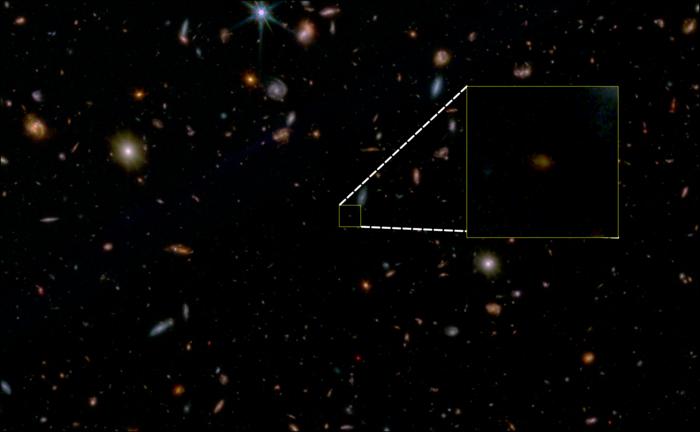Scientists find dead galaxy older than any ever found
‘Unexpected’ galaxy died as the universe was just beginning

Your support helps us to tell the story
From reproductive rights to climate change to Big Tech, The Independent is on the ground when the story is developing. Whether it's investigating the financials of Elon Musk's pro-Trump PAC or producing our latest documentary, 'The A Word', which shines a light on the American women fighting for reproductive rights, we know how important it is to parse out the facts from the messaging.
At such a critical moment in US history, we need reporters on the ground. Your donation allows us to keep sending journalists to speak to both sides of the story.
The Independent is trusted by Americans across the entire political spectrum. And unlike many other quality news outlets, we choose not to lock Americans out of our reporting and analysis with paywalls. We believe quality journalism should be available to everyone, paid for by those who can afford it.
Your support makes all the difference.Scientists have found a “dead” galaxy older than any yet found.
The new cluster of stars was already dead when the universe was at its beginning. It appears to have burnt out when the cosmos was just 5 per cent of its current age.
Star formation had already stopped in the galaxy some 13.1 billion years ago, just 700 million years after the universe began. While scientists have found similar “dead” galaxies before, it is the oldest by 500 million years.
Scientists say the galaxy lived fast and died young, the Cambridge researchers who found it said. Such behaviour was not expected until the new galaxy was discovered.
“The galaxy seemed to have lived fast and intensely, and then stopped forming stars very rapidly,” said astrophysicist Tobias Looser of the Kavli Institute for Cosmology at the University of Cambridge, lead author of the study published in the journal Nature.
“In the first few hundred million years of its history, the universe was violent and active, with plenty of gas around to fuel star formation in galaxies. That makes this discovery particularly puzzling and interesting,” Looser added.
This galaxy is relatively small, with perhaps 100 million to one billion stars. That would put it in the neighborhood of the mass of the Small Magellanic Cloud dwarf galaxy situated near our Milky Way, though that one is still forming new stars.
After a galaxy stops forming new stars, it becomes a bit like a stellar graveyard.
“Once star formation ends, existing stars die and are not replaced. This happens in a hierarchical fashion, by order of stellar weight, because the most massive stars are the hottest and shine the brightest, and as a result have the shortest lives,” Kavli Institute astrophysicist and study co-author Francesco D’Eugenio said.
“As the hottest stars die, the galaxy color changes from blue - the color of hot stars - to yellow to red - the color of the least massive stars,” D’Eugenio added. “Stars about the mass of the sun live about 10 billion years. If this galaxy stopped forming stars at the time we observed it, there would be no sun-like stars left in it today. However, stars much less massive than the sun can live for trillions of years, so they would continue to shine long after star formation stopped.”
The researchers determined that this galaxy experienced a burst of star formation spanning 30 to 90 million years, then it suddenly stopped. They are trying to figure out why.
It could be, they said, due to the action of a supermassive black hole at the galactic center or a phenomenon called “feedback” - blasts of energy from newly formed stars - that pushed the gas needed to form new stars out of the galaxy.
“Alternatively, gas can be consumed very quickly by star formation, without being promptly replenished by fresh gas from the surroundings of the galaxy, resulting in galaxystarvation,” Looser said.
NASA’s Webb is able to look at greater distances, and thus farther back in time, than its Hubble Space Telescope predecessor. Among other discoveries, Webb has enabled astronomers to see the earliest-known galaxies, which have turned out to be larger and more plentiful than expected.
In the new study, the researchers were able to observe the dead galaxy at one moment in time. It is possible, they said, that it later resumed star formation.
“Some galaxies may undergo rejuvenation, if they can find fresh gas to convert into new stars,” D’Eugenio said. “We do not know the ultimate fate of this galaxy. This may depend on what mechanism caused star formation to stop.”
Additional reporting by Reuters
Join our commenting forum
Join thought-provoking conversations, follow other Independent readers and see their replies
Comments